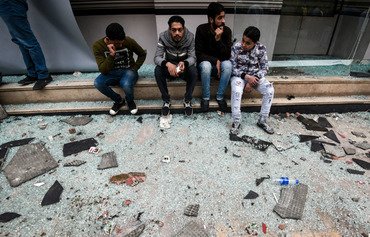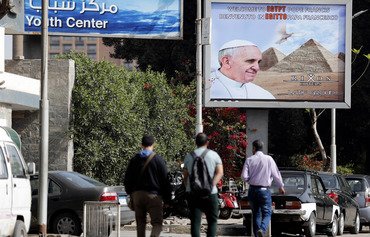Egypt and Lebanon are strengthening collaboration on several fronts to fight terrorism and extremist ideology, Egyptian Foreign Minister Sameh Shukri affirmed during a recent official visit to Lebanon.
The November 15th to 17th visit was designed to further ties between the two countries in a number of ways, experts told Al-Mashareq, including improving joint co-operation to fight terrorism.
Ahead of the visit, Egyptian ambassador to Lebanon Nazih al-Najari told Egypt's Al-Ahram newspaper the countries are already working together to fight terrorism and to reinforce this collaboration, due to its importance.
Work is under way to support Al-Azhar, he said, which is joining forces with Lebanon’s Dar al-Fatwa to confront the extremist ideology propagated by groups such as the "Islamic State of Iraq and the Levant" (ISIL) and al-Nusra Front (ANF), also known as Fatah al-Sham Front.
Security collaboration between Egypt and Lebanon, particularly in the area of counter-terrorism, "is important for both countries", said Lt. Col. Amin al-Zaini, of the Egyptian police, who is attached to Interpol.
Lebanon is on the front line with terrorist groups that have emerged in Syria, he told Al-Mashareq, while Egypt is battling extremists in the Sinai peninsula.
Security co-operation
There has been security collaboration between Egypt and Lebanon on several fronts, al-Zaini said, notably with regard to blacklists and international lists of wanted terrorists that are issued by Interpol.
The two countries are exchanging expertise through joint security training courses, he said, and "are working together to pursue Egyptian and Lebanese nationals who are suspected of having ties with terrorists and terrorist groups".
Through this joint effort, he added, Cairo works to identify terrorists posing as refugees who are attempting to enter Egypt from Lebanon.
Both countries are vulnerable to infiltration via the Mediterranean Sea, he said, which connects them and offers an entry point to smugglers.
Extremist groups operating in Syria such as ISIL and ANF have recruited a number of Egyptians, al-Zaini said, and their return poses a security threat.
"When they return to Egypt, there is a chance these individuals will commit a terrorist act in Sinai or any other province in the country," he said.
A large number of Egyptians are legally employed in legitimate jobs throughout Lebanon, he said. The two governments are joining forces to improve the vetting process of Egyptian nationals, expose any infiltration attempt and deport wanted individuals in collaboration with the Lebanese security services.
Spreading moderate Islam
Religious institutions in both countries are also collaborating to spread moderate Islam among the populace .
Lebanon's Dar al-Fatwa and Egypt’s Al-Azhar Institution are bound by historically strong ties, said Sheikh Rajeh Sabri of the Egyptian Ministry of Religious Endowments.
"For this reason, it is only natural that both sides work together on spreading the true spirit of the Muslim faith, or what has been called moderate Islam, in an attempt to stop the spread of dark terrorist ideology," Sabri told Al-Mashareq.
Both Egypt and Lebanon are under threat from "a terrorist wave of thinking, particularly since the rise of ISIL and ANF", he said.
To address this, Egyptian religious institutions are working with Dar al-Fatwa to reach "young people in poor areas, especially in Beirut and the north [of Lebanon], so as to steer them clear of ideological extremism", he said.
In this regard, Lebanon requires a different approach and preaching methods than Egypt, he noted, due to to the multi-sectarian nature of its society.
Supporting regional stability
Egypt has sought to de-escalate tensions and support efforts to reach consensus in the Lebanese political arena, said Ain Shams University lecturer Ibrahim Fakhr.
"This approach has been observed towards relations between Egypt and all political parties in Lebanon, without exception," he told Al-Mashareq.
Egypt has pursued this policy out of awareness that "a safe Lebanon, with minimal tensions, will ease the security pressure in regional countries", he said.
Lebanon's central position in the region means it can serve as a bulwark against the spread of extremist ideology, he said, adding that its political stability is vital to the region's security.
"Terrorism has been a common and urgent concern," Fakhr said. "Good diplomatic relations between the two countries will allow for better security collaboration as well as the exchange of information and expertise."

![Egyptian Foreign Minister Sameh Shukri (L) meets with Lebanese Speaker of Parliament Nabih Berri during a November 15th to 17th official visit to Lebanon. [Photo courtesy of the Egyptian Foreign Ministry]](/cnmi_am/images/2016/11/24/6622-Lebanon-shukri-berri-600_384.jpg)






